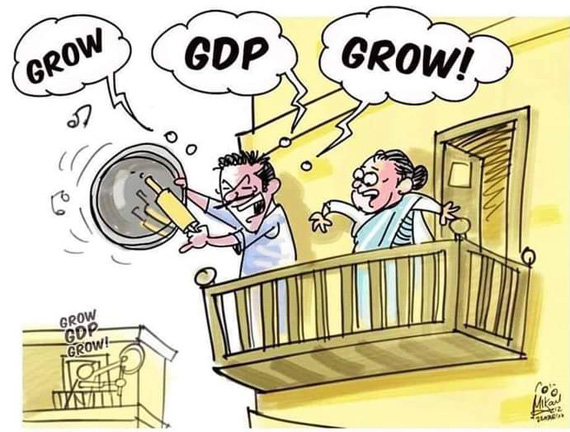
.png) Dr Suresh Mathew
Dr Suresh Mathew

On August 27, Union Finance Minister Nirmala Sitharaman made a farfetched statement: We are facing an ‘act of God’ and it might result in the contraction of the economy. A couple of days later, on August 31, the bombshell was dropped: Indian economy contracted by 23.9 per cent in the second quarter of this year ending in June. It seems the Finance Minister had taken an ‘anticipatory bail’ before the worst news was officially announced. It is the steepest fall in recent decades. According to reports, India’s decline is the worst among the world’s top economies with the US economy shrinking 9.5 per cent and Japan’s 7.6 per cent in the same quarter. The pertinent question is: Is pandemic the sole reason for India’s double-digit negative growth?
The Covid 19 did hit economic activities to the hilt. Industries and business establishments were shut; production was down; jobs were lost; consumption level was drastically down; and investment was not taking place. But what is not clear is why the impact of the Rs 20 lakh crore package announced by the Finance Minister consecutively for about a week is not seen on the ground. It seems the package was not properly planned, as many experts pointed out. It did not put money in the hands of the people to boost consumption. Support from the government through indirect route like promise of increased lending by financial institutions has not borne the desired results. The government failed in transferring cash into the hands of the people, especially the poor who faced an existential crisis, and create public employment programmes especially in urban areas.
Just a few years ago, India was among the fastest-growing economies reaching a growth rate of over 8 per cent. Even before the virus hit Indian economy, something ‘contagious’ had hit it ruthlessly: the demonetization. The economy was facing the disastrous effects of this ill-advised decision months before the tiny virus entered the country. Former Prime Minister Manmohan Singh, a noted economist, had predicted and warned the government that the blunder would lead to a drop of 2 per cent in GDP. Though the mandarins in the government had pooh-poohed the former Prime Minister, he had his fingers on the pulse of the economy and he was proved right. In fact, the Indian economy fell during the seven quarters prior to the pandemic-hit quarter – from 7.1 per cent to 6.6 to 5.8, 5.0, 5.1, 4.1 and 3.1. Hence it would not be right to say that the pandemic is the only reason for the present state of the economy.
Former Governor of the Reserve Bank of India Raghuram Rajan believes that the pre-pandemic slowdown of the economy added to the present unprecedented crisis. His solution to the present predicament is as follows: If one thinks of the economy as a patient, immediate relief is what the patient needs while on the sickbed and fighting disease. This relief can come in the form of more money in the hands of the people which will increase their purchasing power and work as a stimulus to the economy. A government which paid scant regard to his advice against demonetization may not heed to his expert opinion.
(Published on 14th September 2020, Volume XXXII, Issue 38)